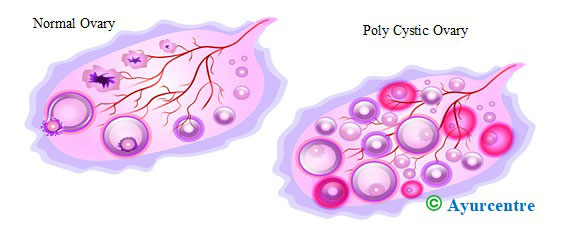info@ayurcentre.in
Our Location
New No.19, 27th Street, L- Block,
Annanagar East, Chennai - 600 102
info@ayurcentre.in
New No.19, 27th Street, L- Block,
Annanagar East, Chennai - 600 102

By: Dr.Rishivandhiyaa.B, B.A.M.S., MS (Ayu) for Ayurcentre, Chennai, India.
Poly Cystic Ovarian Disease or Syndrome commonly called the PCOD or PCOS is a condition that involves multiple systems of the body. It is a condition that predominantly affects the ovaries, also causes irregular menstruation, skin, and hair issues; also a majority of the girls and women with PCOS experience weight gain. PCOS is a leading cause of stress and infertility among women around the world. It is a lifestyle disorder that happens because of hormonal imbalance. Often PCOS is associated with other hormonal imbalances like thyroid imbalance (Hyperthyroidism or Hypothyroidism) and Insulin resistance leading to weight gain and diabetes.
PCOS is a medical condition occurring in women due to the imbalance of reproductive hormones. The menstrual cycle is governed by the H-P-O axis i.e. the Hypothalamic-Pituitary-Ovarian axis. Among these, the Hypothalamus and the pituitary are situated in the brain, while the Ovaries are at the pelvis. The secretions in these organs help in maintaining a regular menstrual cycle and more importantly the release of ovum from the ovaries (called ovulation).

Hence, any disruption in this H-P-O axis causes the failure of ovulation. When the failure to ovulate occurs over a considerable period, leads to the condition of Poly Cystic ovarian disease.
While the causes of PCOS are yet to be clearly defined by modern medicine, Ayurveda explains it very practically that holds so valid in this day and age.
We live in a fast paced world. Cooking at home and eating fresh foods have become a thing of the past. But this has also become the major cause of multiple health concerns including PCOS.
Refrigerated and reheated foods, junk and fast foods, sugar loaded drinks, and protein shakes are all having a very negative impact on metabolism.
To have a daily routine and following through, is not just a sign of discipline but also a foundation for good health. Wakening up late, eating foods at random places and timings are a recipe for hormonal imbalances.
Skipping balancing meals and instead relying on supplements or morning coffee upsets the digestive process. Exercise- too little or too much.
Early to bed and early to rise is a mantra that should not be ignored. Late night entertainments or exposure to gadgets reduces the sleep quality.
Most women do not address their health issues at the earlier stages. Work life imbalance, stress, and fear of being judged further the occurrence of hormonal imbalances.
Other symptoms from the perspective of Ayurveda
The traditional medicine system focusses on treating the cause of the disease, rather than providing symptomatic relief. The physical and psychological factors are taken into account with equal importance and are treated simultaneously.
The Agni (the digestive and metabolic quotient of the body) is corrected, and this facilitates the better formation of the menstrual blood and regulates the hormones and insulin resistance. The medicines from Ayurveda also facilitate the excretions of metabolic wastes from the body. This will aid in weight loss, controlling, and reducing excess hair growth over the face, chest, stomach, and back.
Ayurveda's approach improves health, immunity, and cosmetic concerns by addressing the body in a holistic approach. Also helps women conceive naturally with a healthy baby.
With person specific prescription and diet approach, the management of PCOS becomes possible in a matter of a few months, without the need to consume hormonal and contraceptive pills for years together.